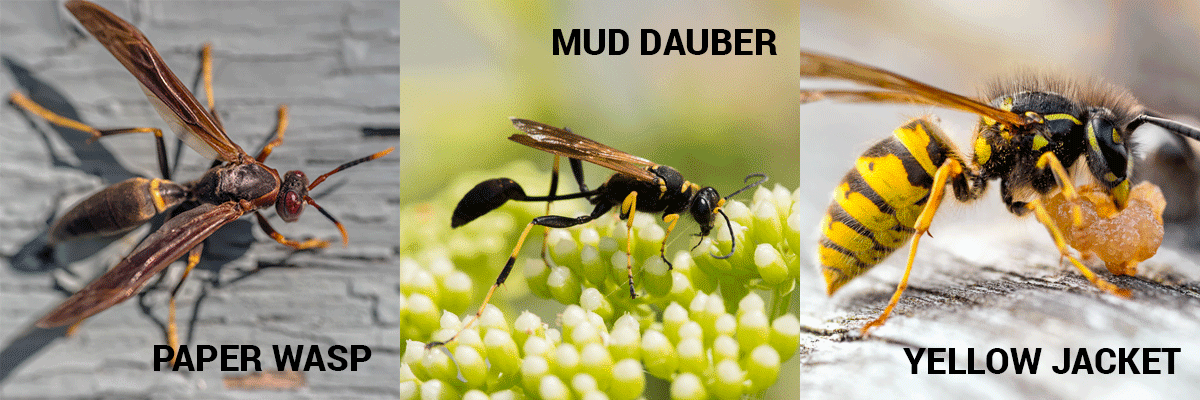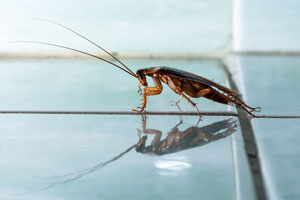Summertime is just around the corner here in the Las Vegas area, and the season of wasps is about to begin! For many, summertime means backyard barbecues, picnics, swimming pools, and more. Unfortunately, it also means more stinging insects on the loose. As you begin to spend more time outdoors in the coming months, it’s important to learn what wasps you need to be on the lookout for: paper wasps, mud daubers, and, of course, yellow jackets! The team at Western Exterminator of Las Vegas is here to keep you informed about these three summertime wasps–keep reading to learn more.

Three Summertime Wasps
Yellow Jackets
Yellow jackets are likely the most commonly known wasp. They are infamous for their aggressive behavior, particularly in the late summer months. As very social insects, yellow jackets congregate in colonies of up to or more than 1,000 workers. For the most part, yellow jackets will not bother you…unless you disrupt their nest. Disturbing a yellow jacket hive is something you want to avoid at all costs. They can repeatedly sting and can be very dangerous.
Mud Daubers
Just as their name suggests, mud daubers construct their nests out of mud. Mud daubers are usually black with light-colored markings or a metallic sheen. Their body is long and slender with a thread-like waist that makes it easy to tell them apart. A mud dauber nest is usually located in covered areas such as porch ceilings, sheds, and attics. These wasps are less aggressive than yellow jackets and tend to be solitary, making them less of a threat.
Paper Wasps
Paper wasps construct umbrella-shaped nests in a paper-like material. These nests often hang from tree branches and twigs, as well as porch ceilings and door railings. A mature nest can have between 20-30 adult wasps living inside. While social in nature, paper wasps are not as aggressive as yellow jackets. However, they may sting to defend their nests; a paper wasp sting is especially potent and could trigger an allergic reaction, making it important to avoid them when you do see them.
How to Prevent Summertime Wasps in Las Vegas
During the summer, it’s important to keep an eye out for summertime wasp activity. This includes inspecting your property for nests on a regular basis. Some of our top wasp prevention tips include:
- When outdoors, wear shoes, especially in grassy areas.
- Do not leave drinks or food in accessible areas.
- Keep windows and doors properly screened.
- Keep garbage in sealed receptacles.
- Do not swat at wasps as it increases the likelihood of an aggressive reaction.
- If stung, seek immediate medical attention, as reactions can be severe.
Need Wasp Control?
It can be difficult to identify summertime wasps, which is why it’s best to leave it up to the professionals. If you suspect wasp activity or spot a nest on your property, contact the wasp removal team at Western Exterminator. Our exterminators can safely and quickly cure you of your wasp problem this summer.

 Allergies are a fact of life in the springtime. Chances are, you or someone you know is dealing with an onslaught of allergy symptoms, from a runny nose to itchy eyes. But what if it’s more than just the weather and trees blooming that is triggering your allergies? With May being National Asthma and Allergy Awareness Month, the team at Rentokil is here to shine light on the dangers of allergies exacerbated by pests. Pest allergens are a result of certain types of pests in your home, making it important to know how to prevent them! Keep reading to learn how to avoid pest and springtime allergies.
Allergies are a fact of life in the springtime. Chances are, you or someone you know is dealing with an onslaught of allergy symptoms, from a runny nose to itchy eyes. But what if it’s more than just the weather and trees blooming that is triggering your allergies? With May being National Asthma and Allergy Awareness Month, the team at Rentokil is here to shine light on the dangers of allergies exacerbated by pests. Pest allergens are a result of certain types of pests in your home, making it important to know how to prevent them! Keep reading to learn how to avoid pest and springtime allergies.